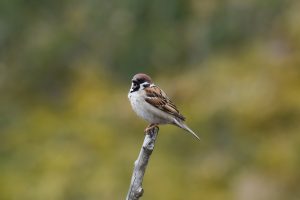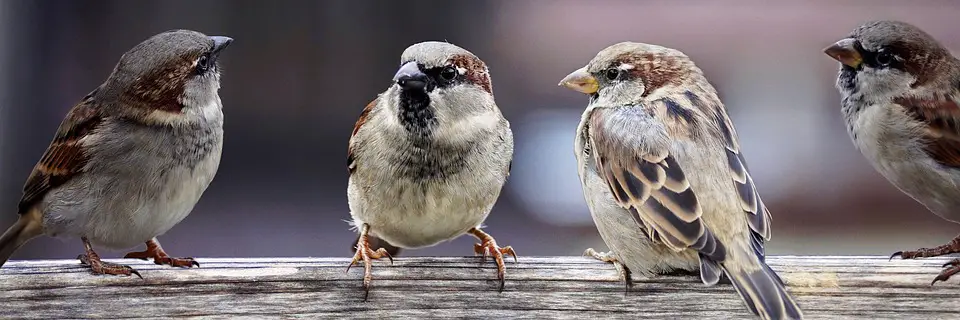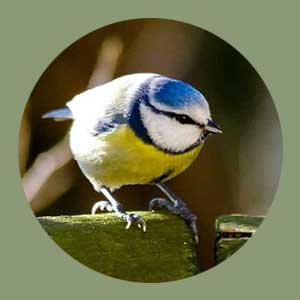I was wondering if sparrows are carnivores or omnivores and so conducted a little experiment in my front garden. I was sure there was a sparrow’s nest in the large hebe growing against the house as I regularly see them dart for cover in there when I walk outside. I placed a selection of goodies on the nearby path and waited to see if they would choose the fattened mealworms (I always pre-soak them), the mixed seed, or the berry-flavoured suet pellets. From the vantage point in my dining room, I watched events unfold.

It didn’t take long for my sparrow friends to find the treats; they seemed particularly fond of the worms. However, between the 4 or 5 birds, they were soon polished off and they headed for the seed. They showed less interest in the suet and when I left, there was still some there. It has since gone, however, that could be down to wood pigeons or my pair of blackbirds.
My very unscientific experiment would have us believe that sparrows are omnivores and happy to eat from all food groups.
Table of Contents
Carnivores, Herbivores, and Omnivores
These are different categories for all animal life based upon their diet.
- Carnivores – Primarily, though not exclusively, meat-eaters. Their diet typically contains mammals, birds, insects, amphibians, fish, and reptiles that they usually hunt or scavenge. Large birds of prey fit into this category, with their sharp talons and strong beaks.
Sparrows enjoy many insects, particularly moths, which they hunt and catch. We have also seen that they’ll happily scavenge dried mealworms. This would lead us to believe that sparrows are possibly carnivores.
- Herbivores – For a bird to be considered herbivorous, the majority of its diet should consist of plant-based food all year-round. There is an unending list of options from seeds, grasses, grains, and buds, through to fruit, nuts, nectar, and sap. Their diet will vary throughout the year depending on seasonal availability, although it remains nutritious. Herbivorous garden birds are often small-bodied with hooked beaks designed to crack nuts and get seed pods open.
Sparrows will scavenge food from the ground or in hanging feeders and enjoy many seed varieties, nuts, and fruit. Although their diet doesn’t solely consist of this, nor is it majority meat-based. Therefore, sparrows are omnivores.
- Omnivores – Birds whose diet regularly consists of both plant and animal-based nutrition are classed as herbivorous. They must eat a significant quantity of both, which the house sparrow certainly does.
Sparrows in the Wild
Given the choice, the sparrow will choose a mostly vegetarian diet, choosing to dine on tender soft grasses and juicy buds. They enjoy many seeds and the design of their beak ensures they make light work of separating the seed from the husk.
However, as a renowned scavenger, the sparrow will find food in most situation and will eat animal life where necessary. This is most evident in early spring and summer when their eating pattern shifts to feed their young when they dine on aphids, caterpillars, bees, spiders, and moths.

Sparrows in the Garden
Sparrows have confidently altered their habits through the years to coincide with their ability to live close to man. Their main reason for being so gregarious is they understand that where there are humans, there is a food source not far behind.
They will happily eat food from feeders or the ground and can be tempted by almost anything, including kitchen scraps. They are attracted by varied seeds and fruit, mine have a particular penchant for overripe pears, but they also enjoy lettuce, peas, apple, cherries, and plums.
Final thoughts
I enjoy feeding sparrows a wide variety of leftovers, they always seem grateful and clear their plates. Now that I know if sparrows are carnivores or omnivores, I shall be regularly topping up the mealworm supply around breeding season.
Hopefully, I can also encourage them to eat the pesky aphid from my roses!
